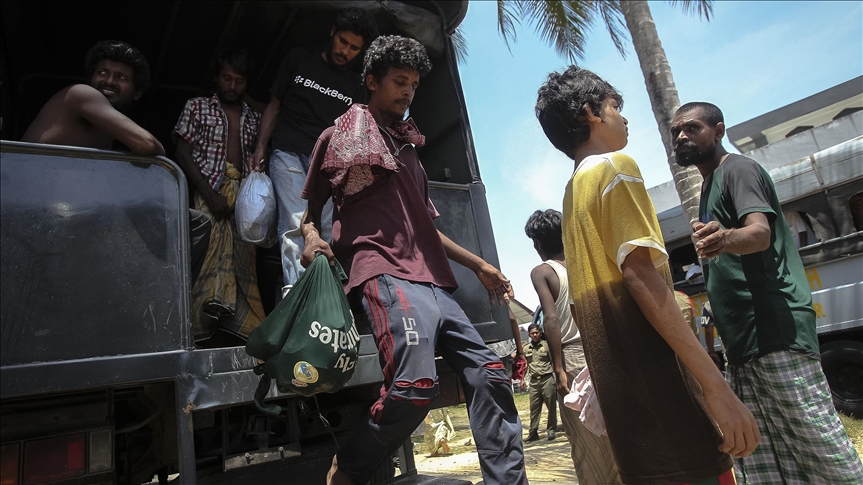Future of Rohingya repatriation talks hangs in balance
Bangladesh says it expects repatriation process to continue 'in right earnest'
 File Photo
File Photo
DHAKA, Bangladesh
Following a military coup in Myanmar on Monday, the repatriation of Rohingya who fled the republic due to persecution has been marred with uncertainty.
Bangladesh is hosting more than a million Rohingya Muslims at cramped makeshift camps in Cox’s Bazar, which is considered the world’s largest refugee settlement.
Most have fled violence following a military crackdown in Myanmar's Rakhine state in 2017. But many still reside in the neighboring country, without citizenship and voting rights.
Myanmar had earlier said it was committed to the repatriation as per a bilateral agreement, with Bangladesh expecting it to start the process in the second quarter of this year.
Military in the Southeast Asian country, however, has now seized power after detaining de-facto leader Aung San Suu Kyi. A one-year state of emergency has been declared. The coup follows a landslide election win by the governing National League for Democracy party in November 2020.
Last month, Dhaka started relocating Rohingya to a remote island in the Bay of Bengal. So far, nearly 7,000 have been transported to Bhasan Char, an island said to be flood-prone.
"The repatriation was already uncertain, now it has been destroyed," Khin Maung, the head of the Rohingya Youth Association, told Anadolu Agency. "It will have a huge impact on our peaceful repatriation to the home country."
He urged the international community to raise its voice in support of democracy, and "pressure Myanmar's military to accept the results of the recent elections."
"There are still more than 600,000 Rohingyas living in Rakhine. I have a lot of relatives there. I worry for them now," said Abdur Rahim, a refugees’ camp leader. "All hopes have been destroyed."
"The UN must act against the Myanmar military," said Mayyu Khan, another Rohingya at the Ukhia camp in Cox's Bazaar. "If the situation is not controlled and our peaceful repatriation is not ensured immediately, it will create problems for all of us."
Maung Zarni, a Rohingya rights activist, in a statement on Twitter said they will suffer due to the coup in Myanmar.
"Who is going to defend Myanmar genocide case at the ICJ, if Aung San Suu Kyi is locked up by the genocidal generals whom she defended with a straight face?" he said, referring to Suu Kyi's last year's statement at the International Court of Justice in which she defended the crackdown on the minority community.
Myanmar is facing genocide charges at The Hague.
Mike Becker, a legal expert, said "these new developments may make the case more difficult."
But the lawsuit can continue, he wrote in a series of tweets. "The military coup in Myanmar does not end the ICJ case, which can continue as long as The Gambia wants it to continue (subject to any jurisdictional challenge by Myanmar)."
He, however, expressed skepticism whether the "post-coup Myanmar will continue to participate in the case."
Bangladesh expects repatriation to continue 'in right earnest'
Following the developments in Myanmar, the Bangladeshi Foreign Ministry said it expects the repatriation process to continue.
"We have been persistent in developing mutually beneficial relations with Myanmar and have been working with Myanmar for the voluntary, safe and sustained repatriation of the Rohingyas sheltered in Bangladesh," it said in a statement. "We expect these processes to continue in right earnest."
Role of Myanmar military
Senior Bangladeshi politician Abdul Moyeen Khan said the fate of the Rohingya Muslims depends on the role of the Myanmar military.
"I do not believe that even after Chinese mediation the citizenships and rights issues of Rohingya will be ensured," he said, referring to the recently held tripartite dialogue on the issue between Bangladesh, Myanmar, and China.
"Both the military regime, and so-called civilian regime are the same for the persecuted Rohingya."
He said all previous moves, mediations and dialogues have "totally failed" in repatriating the refugees.
Could hamper repatriation efforts
Mahboob Ali Khansur, the president of UK-based rights body Equal Rights International, agreed that "both military and civilian administrations of Myanmar are equally responsible for gross human rights violation of the Rohingya for long."
The latest change in regime could hamper the little possibility of Rohingya repatriation, he said. "Now I request the international communities including the UN to stand up meaningfully against the killer Burmese army," he told Anadolu Agency.








